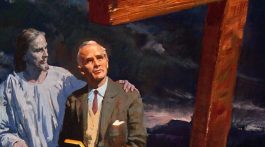~by Marilyne Sayler and Kathy Pflugrad~
“There is nothing more we can do for you.” Those aren’t words any man wants to hear from his physician. Months earlier, Tom Kalinoski was an active forty-something who loved outdoor work. Now he was face-to-face with hopelessness. Kalinoski had suddenly found himself tiring quickly and requiring frequent breaks from fall chores around his home in Thief River Falls, Minnesota.
By spring, the smallest task left him winded. Symptoms intensified—heaviness in his chest and knifelike pain in his left arm. “It was getting hard to do anything,” he recalls.
After failing a stress test, Kalinoski underwent an angiogram. A stent or two and I’ll be back to work in no time, he thought. But the grim-faced cardiologist reported, “You have five blockages in the arteries to your heart. All are 95 percent blocked or worse—one is 100 percent blocked. You need open heart surgery ASAP.”
“Open heart surgery was the worst thing I’d ever been through. Afterward I vowed never to do that again,” Kalinoski remembers. Soon, though, his symptoms returned. Six months post-surgery an angiogram showed all five vessels completely scarred—and inoperable. Instead of facing another surgery he heard that dreaded pronouncement, “There’s nothing more we can do.” His doctors prescribed the lifestyle of a cardiac cripple and told Tom, “You just have to live with it. You have no choice.”
Several miserable years passed. Then Kalinoski learned about CHIP. “I had nothing to lose—I decided to go for it.” Tom liked CHIP’s balanced approach and appreciated the lack of pressure. “We weren’t told ‘This is what you have to do.’ We were given proven reasons why we would want to choose to live differently. There was a lot of friendly support. Food samples at every class were a big help, too.”
When the program ended a few weeks later, Kalinoski was delighted with his results. His cholesterol had dropped 54 points and his blood pressure—high since his teens—was down. His doctor reduced three of his medications. “I feel great!” Tom enthused. “CHIP taught me the reasons to choose a healthier lifestyle, and I will stick with the program because it makes sense.”
Tom has kept that promise. Three years later his cholesterol sits at 151. He is off all medications except a baby aspirin and an occasional long-acting nitro. Tom is happily working in his yard again, his life transformed.
Meanwhile Marilyne Sayler, a neighbor, finds health ministry tremendously fulfilling. She has directed 14 CHIP programs in Thief River Falls and cites story after story of lives touched with hope and healing.
You, too, can bring the proven results and priceless benefits of CHIP to your community. Plan now to attend CHIP Leadership Training at the Minnesota Conference office March 16-18, 2012. For full details, visit: www.sdachip.org/workshops.html or call 423.546.4719.
Photo courtesy of the authors.






